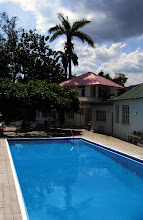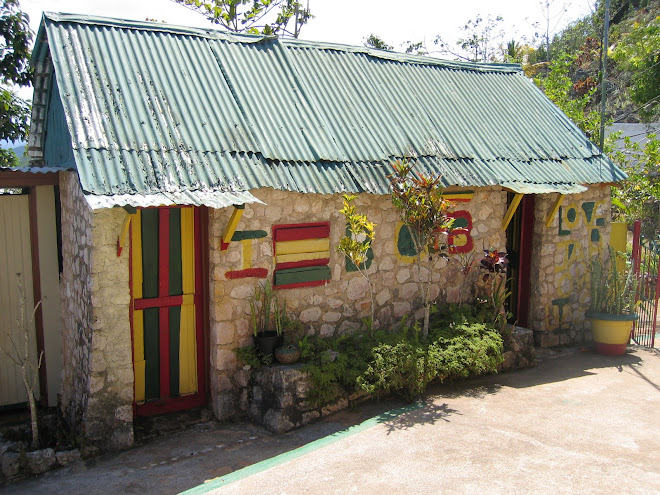
Mirror Mirror
Identity, Race and Protest in Jamaica
Rex Nettleford
(William Collins and Sangster, Jamaica, 1970)
One of the unexpected pleasures of taking over the Beach House was discovering a storeroom full of books. There was a brief moment of euphoria when I thought I’d found a first edition of James Joyce’s Ulysses amongst the musty stacks, but it turned out to be a rather less valuable third edition, although very pleasing all the same. There were a lot of thrillers and Hollywood biogs, but the real treasure turned out to be a select collection of books about Jamaica.
It’s my intention to make my way through this stack and blog about each one over the next few months. I’m starting with Rex Nettleford’s pioneering study of identity and race in Jamaica because this book had such a profound influence on me when I first read it back in the late 1970s. In fact, it was with undisguised joy that I picked it up and carefully tried to peel away another volume that had stuck to the front cover. This is the original hardback edition: long ago I possessed a paperback edition and this was much nicer.
Rex Nettleford has become one of the pre-eminent intellectual and cultural voices from the Caribbean since this book was first published, and I was fascinated to see how well it had aged. Nettleford, who was a Rhodes scholar, returned to Jamaica in 1961 to take up a position of the University of the West Indies. He was a co-author of the first study into the Rastafarian movement in 1961, and two years later he founded the National Dance Theatre Company of Jamaica - which toured extensively in the 70s and 80s. As an academic, social historian and cultural practitioner, he has been at the forefront of the debate about race and identity for nearly half a century. This book collects together various essays he wrote in the 1960s when the issue of Jamaican national identity became a major focus for the newly-independent island.
It was a tumultuous decade: it witnessed a flowering of popular culture in music and the arts that was to have a lasting international impact; the Rastafarians were on the march, and Jamaicans everywhere were faced by the
question: Who are we?
As Nettleford observes: “Notions of national identity centred for a long time on the fight for self-government . . . But once this phase of the ‘struggle’ was won, the question of national identity shifted to definitions about who comprised this ‘native population’ and, by implication, what constituted the ‘nativeness’ of the society.”
Central to these questions, of course, is the position of black Jamaicans in a society “still enslaved in the social structure born of the plantation system in which things African, including African traits, have been devalued and primacy still given to European values …” As a black-skinned Jamaican himself, this concern with the redemption of black people, their culture, self-belief and history in the remaking of post colonial Jamaica made Nettleford remarkably sensitive to the crucial debates that emerged in the 60s.
At a time when they were vilified openly by most middle class Jamaicans, Nettleford wrote sympathetically about Rastafarians - those who had been (and what a haunting phrase this is) ‘liberated from the obscurity of themselves’. He saw quite clearly how the many questions the movement raised about notions of European superiority over all things African would be appropriated by the wider society in the years ahead if Jamaica was to mature as a viable, democratic country. One only has to look at the way images of Bob Marley have been used to advertise – and symbolise - everything Jamaican in the intervening years to see how prescient his concerns were.
The final essay in this collection – The melody of Europe, the Rhythm of Africa – is where we see Nettleford’s essential humanism most fully expressed. He begins the chapter by referencing a poplar Jamaican proverb:
‘Every John Crow ‘tink him pickney white’. John Crow is the Jamaican name for a vulture, so if someone is described as a John Crow it means they are a scavenger, a low-bred and unlovely person. So the proverb translates as “Even the blackest, lowest scavenging beast thinks his child is white’.
Nettleford’s answer to this devastating ‘psychological downpression’ (as Rastafarians call it) is to propose that society moves towards an equilibrium, where “the dynamic interplay of attraction and repulsion
(creates) a third dimension of beauty that can be textured, rich and life-giving.”
“One thing is certain,” he concludes, “There must be the liberation of the Jamaican black … from the chains of self-contempt, self-doubt and cynicism. Correspondingly, there will have to be the liberation of Jamaican whites, real and functional, from the bondage of a lop-sided creole culture which tends to maintain for them an untenable position of privilege. .. Melody and rhythm will no longer be regarded as mutually exclusive phenomena and best of all, no john crow living will feel the need to ‘tink him pickney white’.



1 comment:
Aha! Now THIS is what a Derek Bishton blog is all about . . . Brilliant writing: eloquent, elegant, digestible, persuasive. And on topics that are fresh and challenging. Nice one, our dad :-) x (Though you're not allowed to stop the funny journal pieces either!)
Post a Comment